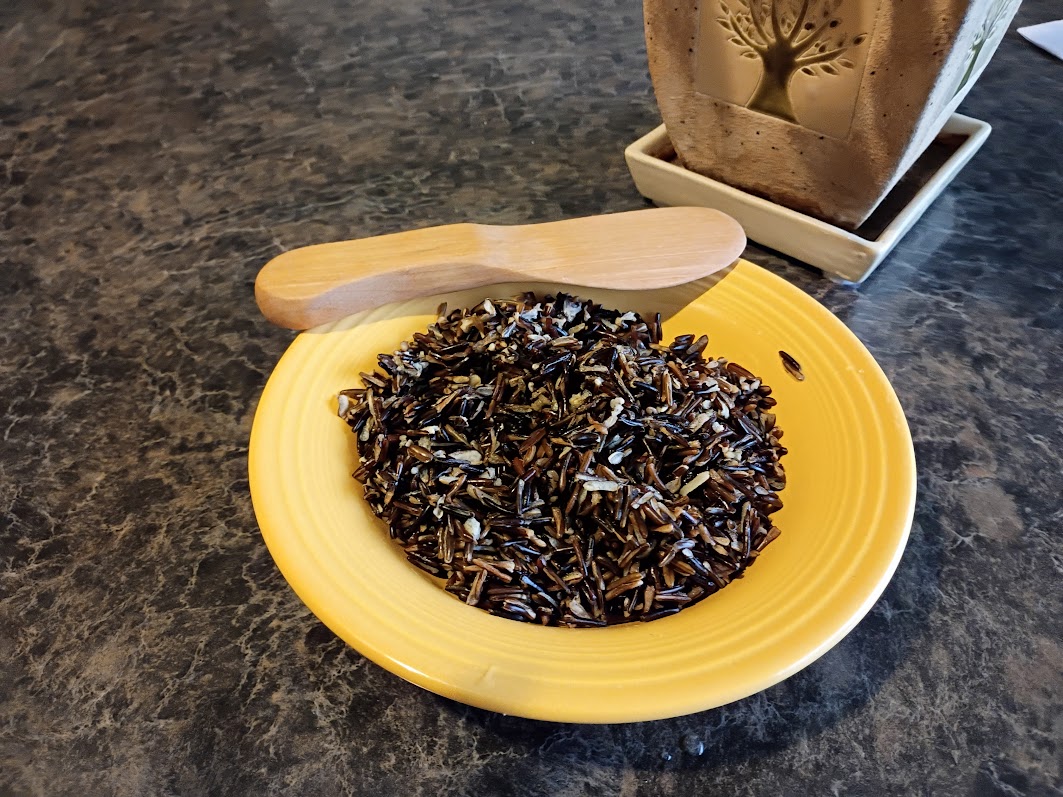Ingredients:
1 C wild rice, rinsed well
1 medium carrot, cut into 1" pieces
1 medium sweet potato, cut into 1/2" pieces
1 medium onion, sliced
1 potato, cut into 1/2" pieces
5 T olive oil, divided
Salt
Freshly ground black pepper
1/4 C apple cider vinegar of vinegar of your choice
1 T maple syrup
Options: ¼ C dried cranberries and/or ½ C roasted hazelnuts, walnuts or sunflower seeds
Directions:
Preheat oven to 375°. In a medium sauce pan over medium heat, combine wild rice and 3 C of cold water. Cover and bring to a boil. Lower heat to a simmer and cook until rice is split and tender, 40 to 45 minutes. Drain excess water and put in a large bowl. See cooked wild rice photo above.
Meanwhile, toss vegetables with 1 T olive oil and spread in an even layer on a large baking sheet. Season with salt and pepper and roast until tender, 25 to 30 minutes.
Combine dried cranberries, vinegar, and maple syrup and shake together using a jar with a lid. Add remaining oil and shake until incorporated. Add dressing and roasted vegetables to bowl with wild rice. Toss to mix ingredients, and serve.
Notes: Other root vegetables can be used in this salad like beets, colorful potatoes or turnips. Roasted Brussels sprouts or peppers are other substitutes. Add leftover turkey or cooked beans to this dish for a main course!
If you would like to be notified when we share new recipes, be sure to scroll to the bottom, provide your email address, check the box confirming you are not a robot, click on a few photos to prove it and click subscribe! You will then receive an email after each new post. Remember, we're always looking for new recipes and stories, so keep sending them to ecopact@fspa.org!
Story: Have you been asked to bring a “dish to pass” this Thanksgiving? Consider Native American ingredients like wild rice, root vegetables that are native to northern Wisconsin and the Americas. This easy salad is adaptable to any root veggies you enjoy! It adds color and a story of those who have lived and cared for this land so long.
We are all grateful for the relationships fostered between the FSPA and native people of northern Wisconsin both at Odanah/Ashland with the Bad River Band of Lake Superior Chippewa and the Lac du Flambeau Band of Lake Superior Chippewa. These encounters change lives, for example, with the sale of Marywood to its original occupants. It is God’s healing hand “mending the breach” through FSPA leaders, Sisters and all who contribute to deepening this encounter. We give thanks for you.
Invitations:
- Learn more about Indigenous Foodways with a look at “Turtle Island: Foods and Tradition of the Indigenous People of North America” or "The Sioux Chef’s Indigenous Kitchen” cookbooks by Sean Sherman Oglala Lakota Sioux Chef and owner of Owamni, a Twin Cities restaurant. His website states that “Sean’s personal mission is to revitalize Indigenous food systems and build awareness of the transformational potential of Indigenous Foodways to restore the health, local economies, culture, and food sovereignty of Native people.
- Check out NATIFS (North American Traditional Indigenous Food Systems) a non-profit organization that works to revitalize Indigenous food systems that generates wealth and improves health in Native communities through food-related enterprises. NATIFS is engaged in advocacy and education, seed and knowledge sovereignty, an Indigenous Food Lab and an Indigenous Foodways curriculum. Their website includes recipes!
- Consumable Christmas gifts are popular. Why not gift a loved one with hand-harvested wild rice which can be found on the NATIFS website? Honor the Native food producers in our country with one of these food business courtesy of Civil Eats, a sustainable foods news source.





Post a Comment